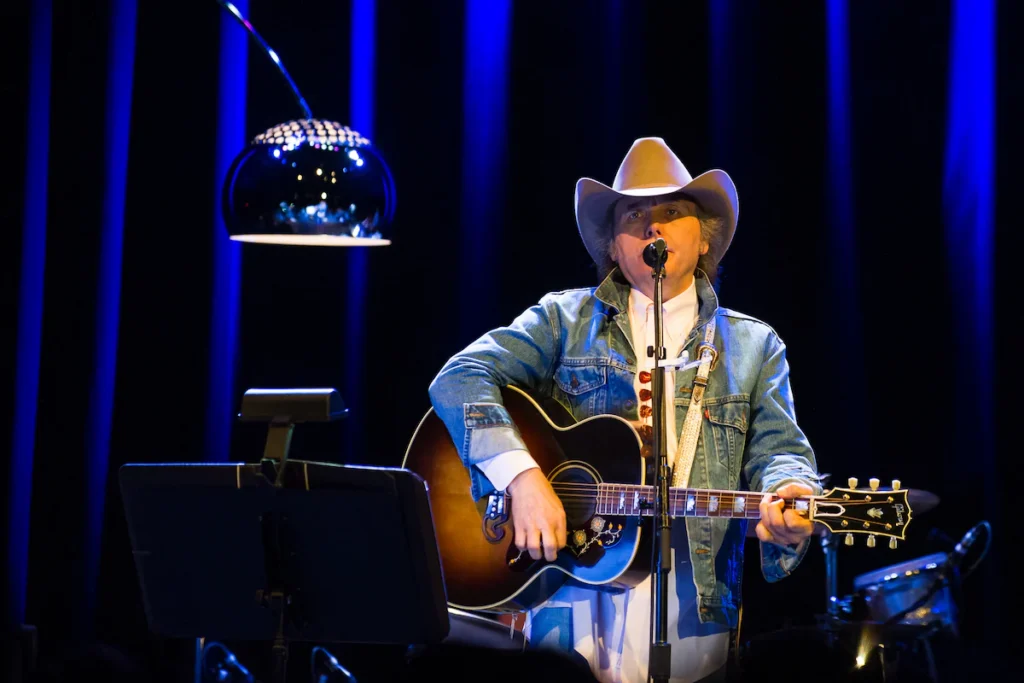
An unspoken warning wrought in melody, “What I Don’t Know” carries the weight of suspicion, unresolved love, and the fine line between ignorance and reckoning—its quiet threat ringing long after the final note.
“What I Don’t Know” emerges as one of Dwight Yoakam’s most compelling deep cuts, featured on his acclaimed 1988 album Buenas Noches from a Lonely Room. Though never released as a single, the track remains a pulsating undercurrent within Yoakam’s golden era of honky-tonk balladry, resonating with listeners who’ve felt love fracture in silence. It stands as a revealing testament to Yoakam’s mastery of combining traditional country storytelling with modern emotional honesty .
The Heart of the Song
At its core, “What I Don’t Know” is built around an age-old tension: “What I don’t know might not hurt me / If I stay dumb and no one tells.” That refrain is simple yet devastating—an admission that ignorance can feel like a shield. Yet Yoakam tempers this with a chilling reminder: if betrayal is uncovered, emotional survival may turn into something much more violent: “But if I find out that you’ve been cheatin’ / What I don’t know might get you killed”.
In the realm of country music, where heartbreak is often accompanied by quiet tears, Yoakam ups the stakes. He conjures images of death row and Smith & Wesson juries, metaphors that lash emotion to mortality. The lyrics are both confession and threat: protect the lie—or else.
Musical Mood and Emotional Resonance
Unlike Yoakam’s more upbeat hits—such as “Guitars, Cadillacs” or “Honky Tonk Man”—this song inhabits a darker, glossier level of introspection. The pace lingers, the guitars hang in the silence, and Yoakam’s delivery is loaded with smoky regret. It’s a slow-burning lament born of the late night, a song meant for solitary moments when memory tugs hardest.
For seasoned listeners, words such as these recall the hush of turning off the porch light, leaving the radio on just long enough for one sad song to finish. Here, Yoakam gifts us one that doesn’t comfort—but warns, instead—echoing like an ember against the dusk of past trust.
A Reflection Made for Older Hearts
Picture the life that song has lived: worn wooden floors, late-night kitchen conversations left unfinished, the traces of love hanging in the air. Yoakam sings for those of us who know how fragile words can be—how quickly trust fractures, how silence can both soothe and suffocate.
The song may make one think of the letter never sent, the apology never spoken, the face turned away. “What I don’t know might not hurt me”—at first, a balm. But then the second half: “might get you killed.” It resonates like a specter rather than reassurance. We recognize that betrayal isn’t just about loss—it’s about the irrevocable shift that follows.
Why It Matters
Despite being an album track rather than a chart hit, “What I Don’t Know” remains an indelible piece of Yoakam’s Americana legacy—precise, raw, and hauntingly relatable. It’s one of those songs that doesn’t make much noise on the first listen, but lingers, curling into the corners of memory.
Yoakam—celebrated for blending honky-tonk twang with elements of punk and country-rock—showcases here his range not just as a stylist, but as a storyteller unafraid of emotional shadows. This isn’t just a country song—it’s a confession, a confession balled tighter than a fist, held half-open in regret.
A Quiet Legacy
For those of us who’ve watched decades roll by, “What I Don’t Know” remains both an echo and a warning. It’s the memory of a window left ajar, the trace of something unsaid, and the ominous quiet after a door closes.
Although the track never claimed a spot on the charts, its power lies in its intimacy. Fans return to it because it doesn’t offer solace—it offers recognition. Recognition that despite all the miles, all the words, sometimes the hardest things are those never spoken.